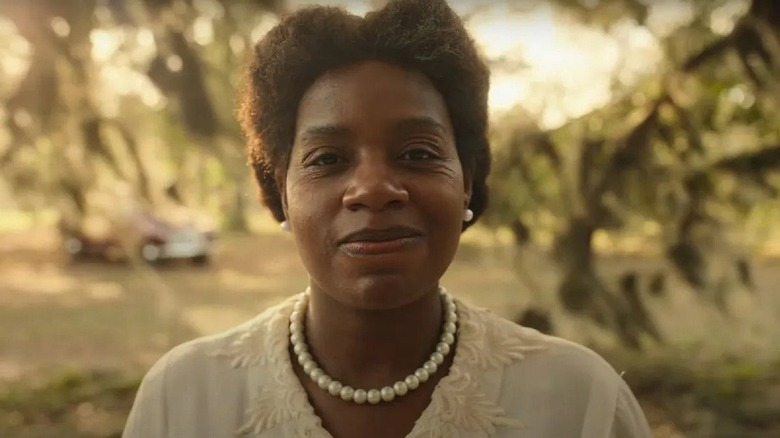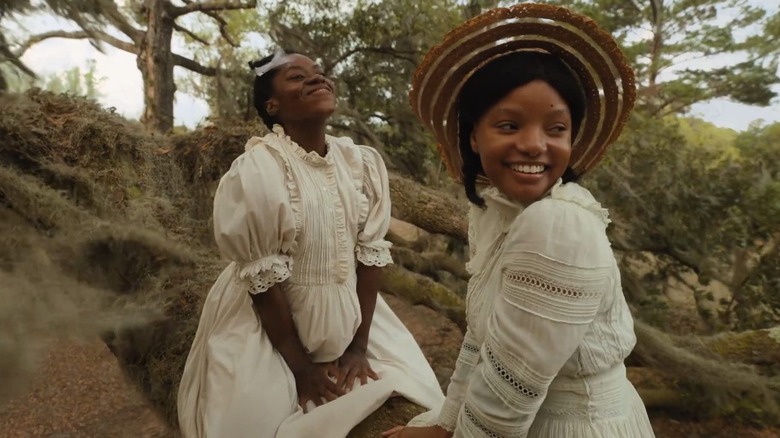The Color Purple Review: A Well-Meaning But Unsuccessful Musical Take On An Iconic Story
When you watch a movie like "The Color Purple," it's almost more difficult to criticize because of how well-meaning it is, and how good its intentions are. The story of the Black woman Celie as she grows up in the still extremely harsh and racist American South in the 1900s started as an Alice Walker novel before being adapted for the big screen by Steven Spielberg in 1985, eventually leading to a Broadway musical that's now being dramatized all over again on the big screen for a Christmas Day release. It's not that this story is new, per se, though a new generation may yet be discovering it through its musical version as opposed to Spielberg's '80s-era take. The concepts and ideas at the core of this story remain arresting, vital, and heartbreaking, but the way those concepts are executed in this big, sometimes splashy and sometimes grim musical are messy at best, and misbegotten at worst.
Fantasia Barrino plays Celie for most of "The Color Purple," once she's grown beyond her juvenile years. Celie has a winning spirit full of hope but is treated harshly by the world, starting when her cruel father separates her and her sister Nettie (Halle Bailey as a young woman), sending the latter to Africa and allowing Celie to be married to the seemingly charming but similarly awful Mister (Colman Domingo). Over time, as Celie grows up, her view of the world expands ever so slightly as she befriends blues singer Shug Avery (Taraji P. Henson) as well as her son-in-law's new wife Sofia (Danielle Brooks), all while she gradually tries to gain more and more freedom from Mister and the generally controlling men in her life.
There's been a habit recently in marketing campaigns for movie musicals like "The Color Purple" or the upcoming "Mean Girls," wherein the ads seem to avoid emphasizing that these are ... movie musicals. It's a strange tack (as other writers have mused, if you don't want to advertise a movie musical, why make a movie musical at all?), but one that does come into sharp relief in this film. Director Blitz Bazawule is no stranger to bringing the Black experience to life in cinematic form, having been involved with Beyonce's 2020 film "Black is King." But while Bazawule does a solid job of staging some of the bigger musical numbers in "The Color Purple" with the same level of charisma and flair you might want, those same musical sections feel almost out of place with the story being told surrounding them. It's not that the non-musical sections are poorly directed, but the many parts of the film with no songs feel as if they've come from an entirely different place.
A film whose execution stumbles
Some of that is by design, of course. "The Color Purple" may have had its story slightly softened and sentimentalized (both by Spielberg and the Broadway version), but so much of the journey that Celie embarks on, physically and emotionally, is intentionally taxing, difficult, and painful. And as staged here by Bazawule and choreographer Fatima Robinson, some of the musical numbers in the film are designed in a way to imply a fantastical escape from the pains of the real world. But highlighting the inconsistencies (when they do arise, as a few of the songs are very much intended to exist in that same painful real world) only emphasizes the strange and sometimes off-putting sense of the old-fashioned song-and-dance seeming to cut away from the darkness of Celie's story. Similarly, where some of the actors are able to straddle both sides of how "The Color Purple" has been mounted, others are only effective at the musical side of things making the other sections a bit more challenging to traverse.
Barrino and Brooks both appeared as Celie and Sofia in iterations of the Broadway musical (and are plenty well-known for their other work, from Barrino's star having risen after appearing on "American Idol" and Brooks having appeared as Taystee on the Netflix series "Orange is the New Black"), but Brooks is far more effective at navigating the fall and rise of Sofia than Barrino is able to balance the dramatic weight of Celie outside of the musical sequences. Henson, Domingo, and Corey Hawkins (the latter playing Mister's son and Sofia's husband) all do as well as possible, but are somewhat hobbled by a script by Marcus Gardley that further trims back the emotional complexity of Walker's work. Though some of the performances are stronger, none of the actors serve as the crutch of "The Color Purple," but the pomp and circumstance of its existence don't quite match with the disturbingly lifeless story unfolding on screen.
Even if marketers seem wary of the genre, it's often a good thing to see a new movie musical, even ones that are as inspired by Broadway as by previous films. But "The Color Purple" is unable to ascend beyond its good intentions into creating a genuinely compelling, entertaining, adult musical. The challenge in adapting this work would be hard for any filmmaker, in balancing singing and dancing with a clear-eyed depiction of the hardships experienced by Black women not just by a racist and sexist society, but by Black men who wished to treat them as property as opposed to people. Blitz Bazawule and a cast of talented performers do their best, but the end result just doesn't gel.
/Film Rating: 4 out of 10

